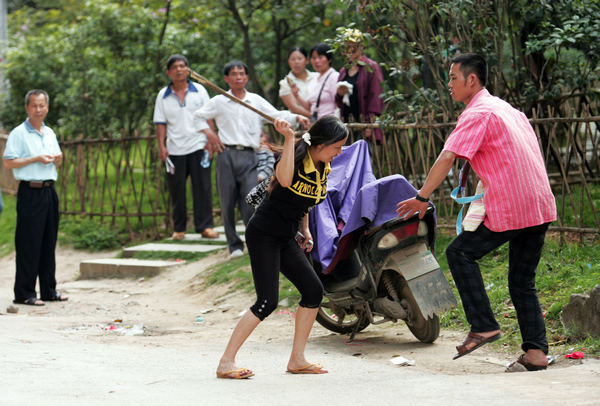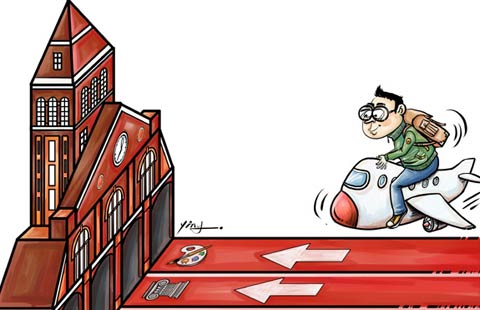Domestic violence casts an ugly shadow
By Jiang Xueqing and He Dan (China Daily) Updated: 2011-11-17 08:11
 |
|
Photo shows spousal abuse in China in the past years. [Photos provided to China Daily] |
Numbers rising
The All-China Women's Federation received 51,171 complaints from women about domestic violence by their spouses in 2010, after seven years when complaints totaled 40,000 to 50,000 annually.
"When we first began to calculate the number, a woman would only file a complaint after she was physically abused by her husband. But now, verbal and sexual abuses are also counted in," said Zhen Yan, vice-president of the federation.
"With the growth of legal consciousness, many women revealed their horrible experience to us in the hope of protecting their legal rights," she said.
According to the survey last year, 83.4 percent of people are aware that China has a special law to protect women's rights and interests, rising 9.6 percentage points from 2000. But the legal system does not protect the victims effectively, experts said.
"Previous laws and regulations concerning domestic violence are difficult to practice. They only demonstrate that our society and government are against such violence," Zhen said.
"That's why our federation is calling for a national law specially devoted to contain domestic violence, to clarify definitions of the offenses, pinpoint responsibilities of relevant departments and ensure the intensity of punishment of violators."
Mediate or abet?
During her nine months of agony and humiliation, Li called the police 10 times. At first, they would send a policeman to her home to find out what happened and make peace between the couple.
Later, Li said, as they kept receiving her phone calls, the police recognized her voice and refused to help anymore. They said it was inconvenient for them to get involved in family disputes.
"Chinese policemen in general think it's very common for a man to beat his wife and do not take such behavior as a form of violence," said Lu Xiaoquan, a lawyer and director of the research department of Beijing Zhongze Women's Legal Counseling and Service Center.
"This attitude determines that their approach to handling domestic violence cases is often unprofessional and unfair," he continued. "Some police officers even stand by the side of the offenders and treat them with indulgence. They don't realize that they have actually encouraged repeat violence."
In many cases, police officers acted as mediators, rather than interrogating both sides and taking a clear record of what happened. Even if they did, the record usually lacks critical information to prove that the victim had suffered domestic violence.
Burden of proof
Lu represents Li in her second attempt to divorce Fan. The court ruled against her in what is called her trial of first instance, saying she did not provide enough evidence to prove her husband had beaten her.
The lawyer recalled another woman he represented who accused her husband of domestic violence in her divorce lawsuit. She called the police after a terrible beating and was questioned at home.
Lu made great efforts to photocopy the written record of interrogation and took it to court. However, the record contained nothing but these few words: "A domestic conflict occurred and was solved through intermediation."
"The judge asked me, 'How can you prove she was beaten by her husband with a police record like this?'" Lu recalled.
In the end, the terms of property division were unfavorable to the woman, but at least she could present the police record of interrogation as evidence in the court. In most cases of domestic violence, the police do not allow plaintiffs and their lawyers to photocopy written records of interrogation.
Sometimes, police officers also ignore the letter issued to a plaintiff by the court, asking for police assistance during an investigation.
Too much burden on the plaintiff to provide evidence makes it hard to win a domestic violence case, Lu said. The center he works for has won less than 10 percent of such lawsuits handled by its lawyers since it was founded as the Center for Women's Law and Legal Services of Peking University in 1995.
- Seven villagers murdered in N China
- China steps up tobacco control efforts
- Five jailed for separatism in Xinjiang
- Letter asks for leniency in poisoning case
- Antibiotics in surface water pose 'indirect health risk'
- Tianjin airport opens up transit link to Beijing
- High levels of antibiotics in China's major rivers
- China to dig tunnel for Asian rail system
- Bering strait line to US possible, experts say
- China: Stop oil rig harassment







